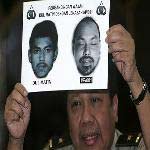
Recently Indonesia police received praise for dismantling a terrorist training camp and killing a leading terror suspect. But security experts say these police raids also indicate a growing terrorism threat in Indonesia.
Since a deadly bombing attack on hotels in Jakarta last year, Indonesian security forces have tracked down the militants responsible and prevented other attacks.
They have also killed Noordin Top, the leader of the group that carried out the attack on the Marriott and Ritz-Carlton hotels. And they hunted down and killed a man known as Dulmantin, who had long been on Indonesia's most-wanted list, suspected of being involved in a 2002 attack on the island of Bali.
While the security forces have been praised for these actions, Andi Widjajanto, a military analyst from the University of Indonesia, is concerned that the increased police activity also indicates an increased level of militant activity.
"I think after the Marriott and (Ritz) Carlton 2009, after the raid of Aceh and Pamulang, there is a strong indication that the network is getting stronger and stronger," Widjajanto said. "It is not getting weaker."
Sidney Jones, a terrorism analyst with the International Crisis Group, says security experts are now learning of a growing alliance of militant groups in Southeast Asia. Some are made up of disaffected members of the regional terror group Jemaah Islamiyah, who feel that JI has become too passive.
She says these groups have been operating since 2008 and many of the militants had served prison sentences for past terrorist activities. This new information she says reflects poorly on police. "The evidence of this group shows the weakness of intelligence. Why did it take so long to realize that released prisoners were involved in the planning of this? Terribly weak monitoring of prisons, prisoners and ex-prisoners and a poor understanding of radicalization and recruitment," Jones states.
She says the security forces should be more proactive in monitoring what she calls high-risk suspects. "When there are people that we know who have been involved with Noordin (Top), or have been involved in violence, who have served their sentences and who are about to get released, and who have been visited regularly by fellow prisoners who have been released, you would think it would trigger something that these people are high risks, so there should be a way of designating some kind of special category for more intensive monitoring," Jones said.
Jones says Indonesia needs to focus more on intelligence work and preventing the recruitment of new militants through education and community involvement.
Since the 2002 bombings on Bali, in which more than 200 people died, the Indonesian government has arrested and tried scores of suspected terrorists, most of them affiliated with Jemaah Islamiyah. It has worked closely with the United States, Australia and its Southeast Asian neighbors to contain militant Islamists who wanted to use violence to establish a single Muslim nation across much of the region.
Local al-Qaida leader killed in Yemen
Christmas Day attack highlights US intelligence gaps
UK, US funding Yemen anti-terror squad
(來源:VOA 編輯:陳丹妮)
